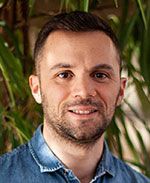Press release -
Sustainability scientist on UN meeting in Stockholm: "We need the same cultural change as when we abolished slavery"
Fifty years after the first decisive environmental summit in the Swedish capital in 1972, delegates are gathering again for Stockholm+50.
"We need the same cultural change as when we abolished slavery, where animals and nature are given the same right to exist as we humans," says Matteo Giusti, a researcher at the University of Gävle in Sweden.
The way we see nature as something we can use and abuse, something we are separated from and not really part of, comes historically from a series of philosophers of the 17th century who saw nature as a machine.

- This was the perfect philosophical foundation for industrial development, unrestrained progress at the expense of animals and the landscape. The idea that animals have no feelings, deserve no empathy, comes from this historical context, says Matteo Giusti.
"Our only chance is to change"
Up until 200-300 years ago, slave trading was widely accepted, says Matteo Giusti, slaves were used and abused and were not considered as human as other people.
- We need to undergo the same kind of cultural change, where we will consider animals as equal and as important as all other forms of life. The life of trees, plants and rivers need to have the same rights to exist as like human life.
And this is something that is now happening, in New Zealand, the Whanganui River has been granted personhood in 2017. In Ecuador, the right of ecosystems to exist was written into the constitution, soon followed by Bolivia.
- We live on a small planet with limited resources. The diversity and richness of all life on Earth is the fabric of life that ensures the regeneration of these resources. If today we make holes too big in such fabric of life, tomorrow that fabric will not be able to support the next generations of people.
Everything you need is available
The researchers' report, published ahead of the UN summit in Stockholm, argues that all the ingredients for change are in place, from growing public support for structural change to the faster-than-expected development of clean technologies.
Change can come by making sustainable lifestyles people’s default choice and by promoting business models that ensure the long-term health of communities, not short-term financial gain.
- There is only one way to ensure long-term sustainable development for our grandchildren. We must change how we look at progress and development. Human progress is only what ensures the health and resilience of all life on the planet," says Matteo Giusti.
The report's recommendations include:
- Replacing GDP as the sole measure of progress and focusing instead on indicators that take into account "inclusive prosperity" and the caring economy
- Establish a regular UN forum on sustainable lifestyles
- A global campaign on nature-based education for children
- Transforming people's everyday relationship with nature by integrating it into cities; protecting animal welfare and shifting to a more plant-based diet
- It also says that politicians should draw on local knowledge from indigenous peoples
- The report calls for improved coordination between states to address ecological and other crises and stronger accountability for those who fail to act
Text: Douglas Öhrbom
Foto Matteo Giusti: Anna Sällberg
-----------------------------
Stockholm+50
On 2nd and 3rd of June 2022, world leaders and representatives from government, business, international organisations, civil society, and youth will gather in Sweden for Stockholm+50. An international meeting to drive action towards a healthy planet for the prosperity of all.
At the 1972 conference, 113 countries adopted the Stockholm Declaration on the Human Environment, placing environmental issues at the forefront of international concerns.
Website Stockholm+50
-----------------------------
Research presentation Matteo Giusti
Urban Studio at University of Gävle
-----
Matteo Giusti, sustainability researcher at the University of Gävle
Tel: 076-781 73 07
E-mail: Matteo.Giusti@hig.se
Topics
- Agriculture, fishing
Categories
- research
- climate change
- sustainable cities
- university of gävle
- matteo giusti
- nature in cities
- environmental psychology
- health-promoting nature
- stockholm+50
Education and Research at a Scenic Campus.
The University of Gävle has approximately 17 000 students, more than 50 study programmes and second-cycle programmes, about 1 000 courses in humanities, social and natural sciences and technology.
Research Profiles
Built Environment and Health-promoting Working Life are the general research profiles of the higher education institution. Important parts included are Spatial Planning with a specialisation in Sustainable Built Environment and Musculoskeletal Disorders with the purpose to prevent work-related injuries. In 2010, the higher education institution received permission to carry out third-cycle programmes in the profile area of Built Environment.
The higher education institution has applied for permission to carry out third-cycle programmes in technology, humanities and social sciences.
